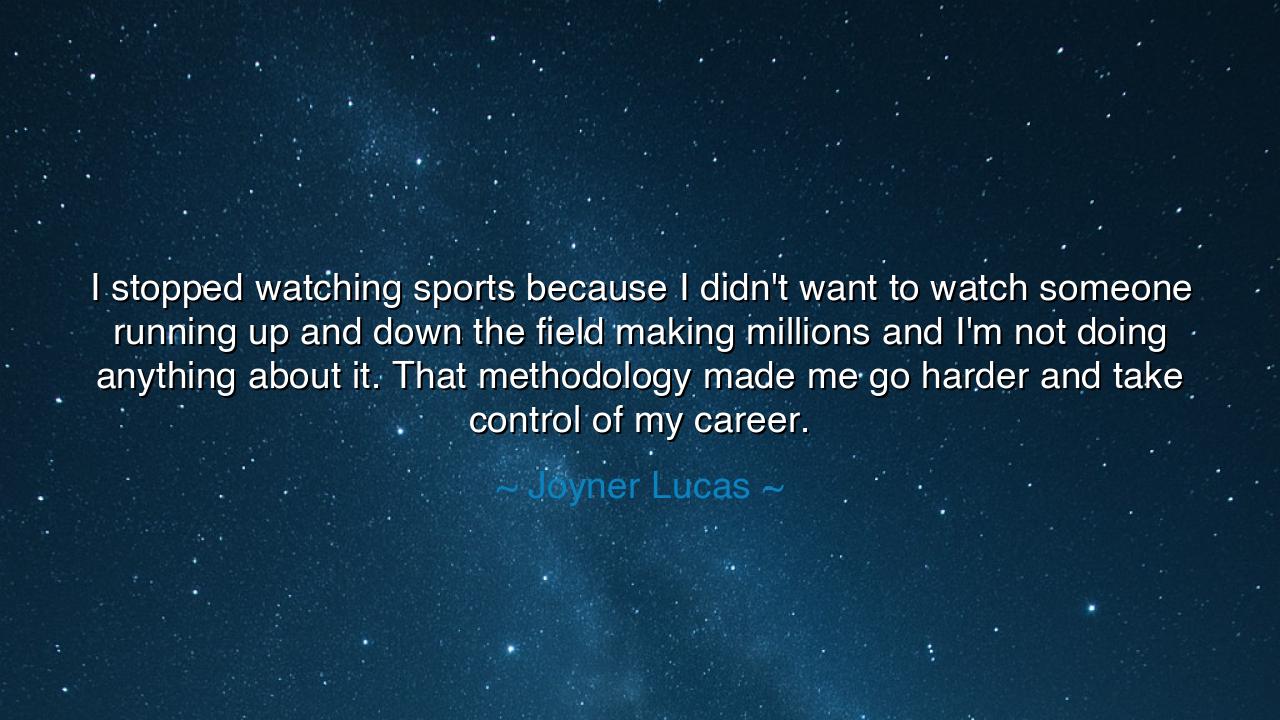
I stopped watching sports because I didn't want to watch someone
I stopped watching sports because I didn't want to watch someone running up and down the field making millions and I'm not doing anything about it. That methodology made me go harder and take control of my career.






Hear now the words of Joyner Lucas, a man who rose from struggle to mastery, and let them strike your heart with fire: “I stopped watching sports because I didn’t want to watch someone running up and down the field making millions and I’m not doing anything about it. That methodology made me go harder and take control of my career.” These words, though born of modern times, carry the voice of the ancients—the eternal cry to cease idle admiration of others’ victories and instead labor for one’s own.
In his youth, Lucas gazed upon athletes, mighty in their craft, their sweat transformed into fortune and acclaim. But rather than lose himself in endless watching, he awakened to a hard truth: that his own time was passing while others reaped the glory. Many are content to sit in the stands or before the screen, feeding on the triumphs of others. Yet Lucas turned away from this path of passive consumption. He chose instead the harder way—the way of discipline, focus, and self-determination.
This wisdom has ancient roots. Recall the tale of Cincinnatus, the Roman farmer who, when his people called upon him, left his plow to lead armies to victory, only to return again to his field. He did not sit idly watching others carry the weight of duty; he acted when the moment demanded. Lucas, in his own way, followed this spirit: why watch another man’s battle when your own awaits you? Why feed on another’s glory when destiny calls you to carve your own?
The deeper meaning of his words is this: to take ownership of one’s life. To “take control of my career,” as Lucas said, is to step from the shadows into the light of responsibility. It is easy to admire the runner on the field, the artist on the stage, the leader on the throne. Harder, yet more noble, is to seize one’s own gift, sharpen it, and labor until the world must take notice. This is not envy but inspiration transformed into action.
Consider also the story of Malcolm X, who, in prison, refused to waste his years in idleness. While others passed the time in chatter or distraction, he devoured books, line by line, page by page, until knowledge armed him with eloquence and power. Like Lucas, he chose not to spectate but to transform. And when his moment came, he spoke with the force of a man who had not wasted his time on the triumphs of others but built his own.
Thus, O listeners, the lesson is clear: do not spend your days merely admiring greatness from afar. Let the success of others awaken not jealousy, nor endless fascination, but the burning question: What am I building with my own hands? If you find yourself lost in distraction, turn away, and let that time become the soil for your own growth. Life is too short to be only a spectator in the arena of destiny.
Therefore, take these words as marching orders: rise from your seat, put aside idle entertainment, and go harder. Seek the place where your talents lie, and labor there with relentless focus. Take control of your path, for no one else will walk it for you. In this way, like Joyner Lucas, you may transform from watcher to doer, from admirer to creator, from one who consumes to one who inspires.
So let it be remembered through the ages: the true victory of life is not to watch another man’s glory, but to create your own. And that, O children of tomorrow, is the call you must answer—not tomorrow, not one day, but now. Take control.






AAdministratorAdministrator
Welcome, honored guests. Please leave a comment, we will respond soon